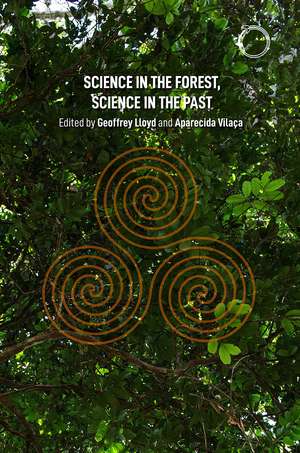Science in the Forest, Science in the Past: Special Issues in Ethnographic Theory
Editat de Geoffrey E. R. Lloyd, Aparecida Vilaçaen Limba Engleză Paperback – 31 dec 2020
Science in the Forest, Science in the Past is a pioneering interdisciplinary exploration that will challenge the way readers interested in sciences, mathematics, humanities, social research, computer sciences, and education think about deeply held notions of what constitutes reality, how it is apprehended, and how to investigate it.
Preț: 185.04 lei
Nou
Puncte Express: 278
Preț estimativ în valută:
35.41€ • 37.07$ • 29.30£
35.41€ • 37.07$ • 29.30£
Carte disponibilă
Livrare economică 15-29 martie
Livrare express 01-07 martie pentru 25.16 lei
Preluare comenzi: 021 569.72.76
Specificații
ISBN-13: 9781912808410
ISBN-10: 1912808412
Pagini: 290
Ilustrații: 9 halftones
Dimensiuni: 152 x 229 x 25 mm
Greutate: 0.4 kg
Ediția:1
Editura: HAU
Colecția HAU
Seria Special Issues in Ethnographic Theory
ISBN-10: 1912808412
Pagini: 290
Ilustrații: 9 halftones
Dimensiuni: 152 x 229 x 25 mm
Greutate: 0.4 kg
Ediția:1
Editura: HAU
Colecția HAU
Seria Special Issues in Ethnographic Theory
Notă biografică
Geoffrey E. R. Lloyd is professor emeritus of ancient philosophy and science at the University of Cambridge, where he was master of Darwin College from 1989 to 2000. He has published over thirty books, most recently Being, Humanity and Understanding and The Ambivalences of Rationality: Ancient and Modern Cross-Cultural Explorations. Aparecida Vilaça is professor of social anthropology at the National Museum, Federal University of Rio de Janeiro. She is the author of Strange Enemies: Indigenous Agency and Scenes of Encounters in Amazonia and Praying and Preying: Christianity in Indigenous Amazonia, among others.
Cuprins
Preface
Geoffrey E. R. Lloyd and Aparecida Vilaça
Acknowledgments
Chapter 1. The Clash of Ontologies and the Problems of Translation and Mutual Intelligibility
Geoffrey E. R. Lloyd
Chapter 2. Inventing Nature: Christianity and Science in Indigenous Amazonia
Aparecida Vilaça
Chapter 3. A Clash of Ontologies? Time, Law, and Science in Papua New Guinea
Marilyn Strathern
Chapter 4. Mathematical Traditions in Ancient Greece and Rome
Serafina Cuomo
Chapter 5. Is there Mathematics in the Forest?
Mauro William Barbosa de Almeida
Chapter 6. Different Clusters of Texts from Ancient China, Different Mathematical Ontologies
Karine Chemla
Chapter 7. Shedding Light on Diverse Cultures of Mathematical Practices in South Asia: Early Sanskrit Mathematical Texts in Conversation with Modern Elementary Tamil Mathematical Curricula (in Dialogue with Senthil Babu)
Agathe Keller
Chapter 8. Antidomestication in the Amazon: Swidden and its Foes
Manuela Carneiro da Cunha
Chapter 9. Objective Functions: (In)humanity and Inequity in Artificial Intelligence
Alan Blackwell
Chapter 10. Modeling, Ontology, and Wild Thought: Toward an Anthropology of the Artificially Intelligent
Willard McCarty
Chapter 11. Rhetorical Antinomies and Radical Othering: Recent Reflections on Responses to an Old Paper Concerning Human–Animal Relations in Amazonia
Stephen Hugh-Jones
Chapter 12. Turning to Ontology in Studies of Distant Sciences
Nicholas Jardine
Chapter 13. Epilogue: The Way Ahead
Geoffrey E. R. Lloyd and Aparecida Vilaça
Geoffrey E. R. Lloyd and Aparecida Vilaça
Acknowledgments
Chapter 1. The Clash of Ontologies and the Problems of Translation and Mutual Intelligibility
Geoffrey E. R. Lloyd
Chapter 2. Inventing Nature: Christianity and Science in Indigenous Amazonia
Aparecida Vilaça
Chapter 3. A Clash of Ontologies? Time, Law, and Science in Papua New Guinea
Marilyn Strathern
Chapter 4. Mathematical Traditions in Ancient Greece and Rome
Serafina Cuomo
Chapter 5. Is there Mathematics in the Forest?
Mauro William Barbosa de Almeida
Chapter 6. Different Clusters of Texts from Ancient China, Different Mathematical Ontologies
Karine Chemla
Chapter 7. Shedding Light on Diverse Cultures of Mathematical Practices in South Asia: Early Sanskrit Mathematical Texts in Conversation with Modern Elementary Tamil Mathematical Curricula (in Dialogue with Senthil Babu)
Agathe Keller
Chapter 8. Antidomestication in the Amazon: Swidden and its Foes
Manuela Carneiro da Cunha
Chapter 9. Objective Functions: (In)humanity and Inequity in Artificial Intelligence
Alan Blackwell
Chapter 10. Modeling, Ontology, and Wild Thought: Toward an Anthropology of the Artificially Intelligent
Willard McCarty
Chapter 11. Rhetorical Antinomies and Radical Othering: Recent Reflections on Responses to an Old Paper Concerning Human–Animal Relations in Amazonia
Stephen Hugh-Jones
Chapter 12. Turning to Ontology in Studies of Distant Sciences
Nicholas Jardine
Chapter 13. Epilogue: The Way Ahead
Geoffrey E. R. Lloyd and Aparecida Vilaça
Recenzii
"Is there one big Science, or are there many legitimate forms of knowledge? Are primary qualities the sole object of scientific inquiry, or is there a space for investigating the multidimensionality of phenomena? Are the ontological foundations of different systems of worlding incompatible, or do they allow hybridization and the expression of foundational principles? This innovative book tackles these questions afresh by bringing together an impressive set of international scholars in fields ranging from ancient civilizations and non-Western cultures to the computing sciences. Their deconstruction of the sterile deadlock between universalism and relativism will be a milestone for years to come."
"The volume is. . .well worth taking the time to read. I encourage engaging and reflecting. . ."
"The chapters of this book constitute serious and detailed reflections on forms of knowledge that go beyond, in different times and spaces, those where anthropology as a science has historically been constituted. Approaching these differences, understanding their inflections, languages, and areas of interest, could not be more useful at a time when the prevailing forms of knowledge seem to have reached unprecedented material and social limits."


